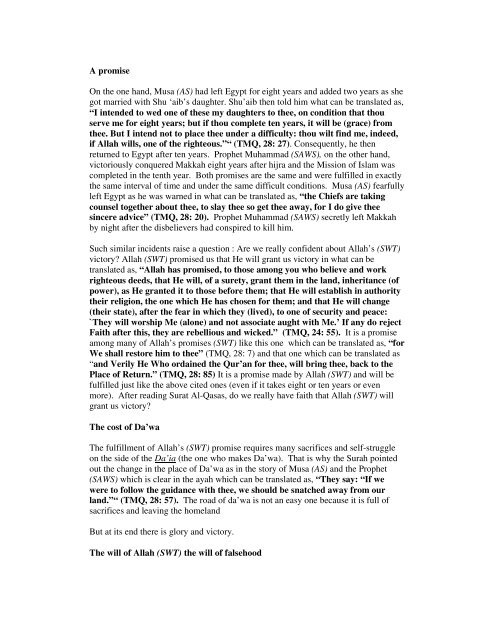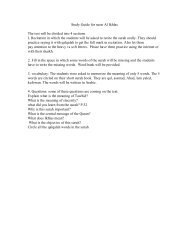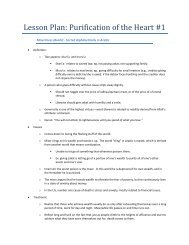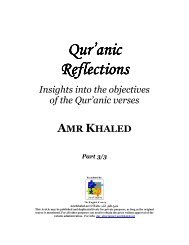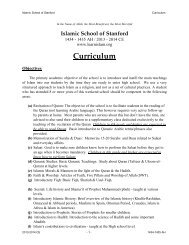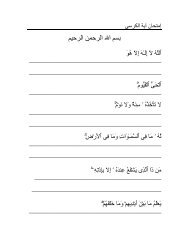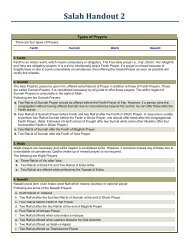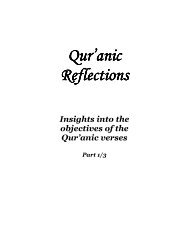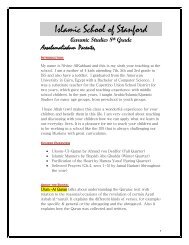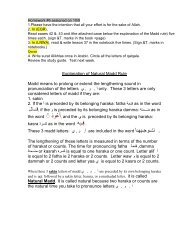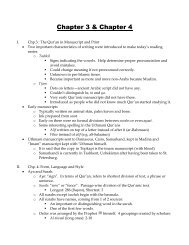Quranic Reflections - Islamic School of Stanford
Quranic Reflections - Islamic School of Stanford
Quranic Reflections - Islamic School of Stanford
Create successful ePaper yourself
Turn your PDF publications into a flip-book with our unique Google optimized e-Paper software.
A promise<br />
On the one hand, Musa (AS) had left Egypt for eight years and added two years as she<br />
got married with Shu ‘aib’s daughter. Shu’aib then told him what can be translated as,<br />
“I intended to wed one <strong>of</strong> these my daughters to thee, on condition that thou<br />
serve me for eight years; but if thou complete ten years, it will be (grace) from<br />
thee. But I intend not to place thee under a difficulty: thou wilt find me, indeed,<br />
if Allah wills, one <strong>of</strong> the righteous.”“ (TMQ, 28: 27). Consequently, he then<br />
returned to Egypt after ten years. Prophet Muhammad (SAWS), on the other hand,<br />
victoriously conquered Makkah eight years after hijra and the Mission <strong>of</strong> Islam was<br />
completed in the tenth year. Both promises are the same and were fulfilled in exactly<br />
the same interval <strong>of</strong> time and under the same difficult conditions. Musa (AS) fearfully<br />
left Egypt as he was warned in what can be translated as, “the Chiefs are taking<br />
counsel together about thee, to slay thee so get thee away, for I do give thee<br />
sincere advice” (TMQ, 28: 20). Prophet Muhammad (SAWS) secretly left Makkah<br />
by night after the disbelievers had conspired to kill him.<br />
Such similar incidents raise a question : Are we really confident about Allah’s (SWT)<br />
victory Allah (SWT) promised us that He will grant us victory in what can be<br />
translated as, “Allah has promised, to those among you who believe and work<br />
righteous deeds, that He will, <strong>of</strong> a surety, grant them in the land, inheritance (<strong>of</strong><br />
power), as He granted it to those before them; that He will establish in authority<br />
their religion, the one which He has chosen for them; and that He will change<br />
(their state), after the fear in which they (lived), to one <strong>of</strong> security and peace:<br />
`They will worship Me (alone) and not associate aught with Me.’ If any do reject<br />
Faith after this, they are rebellious and wicked.” (TMQ, 24: 55). It is a promise<br />
among many <strong>of</strong> Allah’s promises (SWT) like this one which can be translated as, “for<br />
We shall restore him to thee” (TMQ, 28: 7) and that one which can be translated as<br />
“and Verily He Who ordained the Qur’an for thee, will bring thee, back to the<br />
Place <strong>of</strong> Return.” (TMQ, 28: 85) It is a promise made by Allah (SWT) and will be<br />
fulfilled just like the above cited ones (even if it takes eight or ten years or even<br />
more). After reading Surat Al-Qasas, do we really have faith that Allah (SWT) will<br />
grant us victory<br />
The cost <strong>of</strong> Da’wa<br />
The fulfillment <strong>of</strong> Allah’s (SWT) promise requires many sacrifices and self-struggle<br />
on the side <strong>of</strong> the Da’ia (the one who makes Da’wa). That is why the Surah pointed<br />
out the change in the place <strong>of</strong> Da’wa as in the story <strong>of</strong> Musa (AS) and the Prophet<br />
(SAWS) which is clear in the ayah which can be translated as, “They say: “If we<br />
were to follow the guidance with thee, we should be snatched away from our<br />
land.”“ (TMQ, 28: 57). The road <strong>of</strong> da’wa is not an easy one because it is full <strong>of</strong><br />
sacrifices and leaving the homeland<br />
But at its end there is glory and victory.<br />
The will <strong>of</strong> Allah (SWT) the will <strong>of</strong> falsehood


